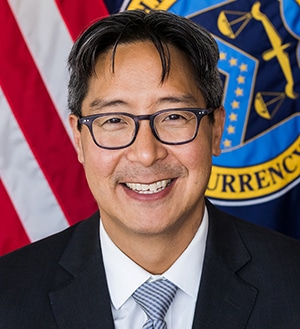
The time is ripe to rethink the frameworks used to analyze bank merger applications, according to Acting Comptroller of the Currency Michael J. Hsu.
“Without enhancements, there is an increased risk of approving mergers that diminish competition, hurt communities, or present systemic risks,” he said before the Brookings Institution.
“On the other hand, imposing a moratorium on mergers would lock in the status quo and prevent mergers that could increase competition, serve communities better, and enhance industry resiliency,” he added.
On Monday, May 9, Aaron Klein, senior fellow in the Center on Regulation and Markets at Brookings, invited remarks from Hsu about the need to rethink large bank resolvability and industry resilience.
Ten years ago, in the wake of the financial crisis, Congress changed the way large banks could merge or be acquired, according to Klein.
Today regulators have begun rethinking what considerations should guide evaluations of bank mergers in light of new competition from financial technology firms and credit unions, the increased consolidation of the industry and lessons learned in the aftermath of the financial crisis, consumer and community needs, and changes in the nature of banking, he said.
In his remarks, the Acting Comptroller said that bank mergers should serve communities, support financial stability and industry resilience, enhance competition, and enable diversity and dynamism of the banking industry.
“Revisions to the bank merger framework would help to realize this goal,” he said.
Under the Bank Merger Act, the Department of Justice’s Antitrust Division (DOJ) and the appropriate federal banking agency have shared responsibility for assessing the competitiveness impact of a proposed merger, he said.
The Acting Comptroller said that DOJ’s recent request for public comment clearly signals a desire to update its guidelines and analytical framework. OCC staff has been engaging with DOJ staff, as well as staff of other federal agencies, on this.
Hsu said that in healthy mergers, the acquiring bank can improve the risk management and controls of the target bank, and ensure that the integration of systems, processes, and people is executed in a timely manner as planned, and the business model unfolds as projected.
“Such cases are win-win: Communities are better served, and the resulting institution is more safe and sound than the two banks individually,” he said.
Bank supervisors are generally well-positioned to assess whether the financial and managerial resources of the acquiring bank are capable of executing a merger effectively and efficiently, he said.
“I do not see a need at this time for significant changes in how supervisors assess this prong,” he said.
With that stated, too-big-to-manage is a risk with mergers, especially for banks engaged in serial acquisitions, he said.
A review of institutions that grew through multiple mergers could reveal 11 additional factors for supervisors to consider when assessing banks’ financial and managerial resources, he added.
The Acting Comptroller does not think the statutory prongs of competitiveness, safety and soundness, meeting community needs, and financial stability need to be revisited.
“Rather, the modes of analysis used by regulators to apply these factors need to be improved. My sense is that the degree and nature of change required varies by prong,” he said.



